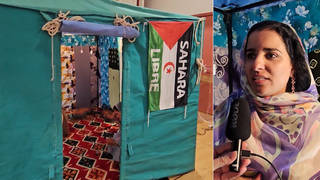
As the latest polls say that nearly half of Americans now say that the Iraq war was not worth it, we hear from two women whose husbands are currently deployed in Iraq as well as a mother who lost her son in Iraq. [Includes transcript]
Click here to read to full transcript Today is veteran’s day and we are going to spend the rest of the hour hearing from veterans, from families who have lost loved ones in Iraq, as well as two women whose husbands are currently deployed in Iraq. Today, a number of veterans groups are protesting outside the Walter Reed Medical Center in Maryland, the main hospital treating returning wounded soldiers.
Their protest comes as a new report in the military newspaper, Stars and Stripes, reveals that more than 7,000 wounded US soldiers have been treated at a single US military hospital — Landstuhl Regional Medical Center — in Germany. The counts of wounded treated at other US military hospitals is unknown. Some veterans groups are calling for an immediate investigation to determine how and why the US military is downplaying or concealing the high number of wounded. According to Pentagon figures, nearly 400 US soldiers have died in Iraq since the invasion began in March.
Meanwhile, the latest polls say that nearly half of Americans now say that the Iraq war was not worth it.
- Jane Bright, mother of Sgt. Evan Ashcraft who died on July 24 along with two other U.S. soldiers in an ambush near Mosul. Evan was 24 years old.
- Candance Robison, her husband, Army 1st Lieutenant Mike Robison, is stationed with the 82nd Airborne Division in Fallujah.
- Jari Sheese, her husband, Douglas Salewesky, is currently deployed in Iraq where he was tasked with setting up Iraqi media.
TRANSCRIPT
AMY GOODMAN: Jane Bright, welcome to Democracy Now!.
JANE BRIGHT: Thank you, Amy.
AMY GOODMAN: Can you talk about your son? I know that you have visited his grave yesterday.
JANE BRIGHT: Yes. I was there — I’m there as often as I can be. I’ll be there again today. Evan was what so many of these young people are, he was a leader. He had been a team leader for quite some time prior to being promoted to sergeant. His team loved him. I have talked to some of them. He was very, very intelligent. He was — he played classical piano. He had a really bright future. And so many of these young people have that type of history and strong family support, and he — The first thing that comes to mind when I think of what’s going on over there is we’re killing off our next generation and we’re sitting by and watching it happen.
AMY GOODMAN: Can you talk about the Bush administration’s handling of the invasion? Your thoughts when your son first went and your thoughts today?
JANE BRIGHT: I had been very vocal about my anti-war sentiments. Evan knew how I felt. We agreed as he was leaving that my feelings about the war were not the issue, that the issue was for him to go do his job, come home, be safe. In terms of the Bush administration, I think that it is — well, I don’t think. It’s obvious if you go online, if you pick up any newspapers, there are no weapons of mass destruction. There was no imminent threat from Iraq. Iraq has turned out to be a relatively powerless country. We invaded a sovereign state.
JANE BRIGHT: My son died for oil. They’re all dying for oil. They’re all dying for — they being the young Americans — the men, the women, they’re dying for the United States, so that this administration can dominate the world or begin the process of world domination, this Pre-emption is what they’re there for.
AMY GOODMAN: We’re also joined on the phone by Candace Robison, her husband Mike Robison is stationed with the 82nd airborne in Fallujah. Welcome to Democracy Now!.
CANDACE ROBISON: Thank You.
AMY GOODMAN: You are speaking out. Your husband is in Iraq. What are his feelings about this?
CANDACE ROBISON: He supports me 100% what I’m doing. Obviously, I cannot speak for him and our political beliefs are on opposite ends of the spectrum. Now he has had some frustration over the way things have been handled, especially post-war, but he kind of does his thing and I do mine and we just both choose to support each other.
AMY GOODMAN: What are you doing to voice your opposition here in the United States?
CANDACE ROBISON: Well, August 18th I organized a rally in Crawford while Bush was there on one of his many vacations. September 9, I went to D.C. and spoke at a congressional briefing that was sponsored by Congresswoman Maxine Waters. I was part of a press conference this weekend in San Antonio that was all military families speaking out about their soldiers still being in Iraq and their situation there. I do a lot of writing to senators and congressmen and I think they see my name on the outside of an envelope and they cringe. Today my daughter is wearing a shirt to school that says Troops… I don’t think that the kids should be at school today.
AMY GOODMAN: What does her t-shirt say?
CANDACE ROBISON: It says, Troops, the heart of Texans are upon you. It is a shirt from Texans for peace.
AMY GOODMAN: We’re also joined on the phone by Gerry Shischi, whose husband, Douglas Saloweski, is in Iraq. You’re thoughts this veterans’ day.
GERRY SHISCHI: I’d like to tell everybody they’ve I have the utmost respect to all of the soldiers who have fought in any of the past wars. It’s certainly nothing against them. This current war that we’re fighting in Iraq and also in Afghanistan, the problem is the reason why we’re there. The lies that we were told about — as the other — the other person said earlier about the weapons of mass destruction. The reasons why they gave us for this war, and our men and women are dying for an unjust war and they need to come home now.
AMY GOODMAN: You say that your concerned that your husband is feeling the consequences of your speaking out?
GERRY SHISCHI: Yes. My husband had been serving in Ramadi for the last seven months and his particular unit that he’s serving in, they do public affairs, and communications, so they all have all of the equipment to be able to communicate with us. I have felt very, very lucky all of that time nearly on a daily basis I was able to have some form of communication most generally an email or even an instant message with my husband. But since I have been speaking out for the last few weeks, I know for a fact that my husband told me that the report — the general in that particular area — gets a report twice a day, and my name came up in the report one day. And now last week, my husband was sent away to another area that I don’t know where he is at but he obviously has no way to communicate with me, because I have heard nothing from him except for a couple of nights ago, I got a collect phone call from him in the middle of the night. He told me that he felt like this was in retribution for me speaking out, and to silence him.
AMY GOODMAN: Candace Robison, have you felt any of the kind of pressure that Gerry Shischi is feeling now?
CANDACE ROBISON: Oh yeah, my name also came up in a report that my husband got and he was called to the battalion commanders office over me speaking out. He told them whether he agrees with what I’m doing or not, he wouldn’t stop me from doing it. Although he does think that what I’m doing is right because I feel so passionate about it. But he had an altercation one of another soldier’s family members made a threat against me and my children, and because of this, they moved my husband to battalion headquarters to separate the two guys.
AMY GOODMAN: Jane Bright, I know that you have to leave, but I wanted to ask your views on the Bush administration policy of not showing pictures of the caskets as they returned home. What happened in your son’s case, in Evan’s case?
JANE BRIGHT: We were told that we could not view the casket. He was flown from Iraq to Dover
AMY GOODMAN: Could you speak a little bit louder?
JANE BRIGHT: He was flown from —
AMY GOODMAN: Somehow we’re not able to hear you. We’re going to try to bring down the other phone.
JANE BRIGHT: Can you hear me now?
AMY GOODMAN: Much, much better.
JANE BRIGHT: He was flown from Iraq to Dover and from Dover to Burbank airport. We asked if we could meet his casket when he arrived in Burbank. We were told in no uncertain terms by the army that no family members could be there, only military personnel could be there. I think it’s clear that as the numbers mount, for instance, the 16 that were killed two weeks ago and the six this past week from my husband’s unit, that as those numbers accumulate and as Americans start to see the caskets lined up, there is going to be an outcry. Right now it’s slow, small rumble. It’s — these great wives and parents like me who — I mean, I feel like I have nothing to lose. What can they do to me now? You know? Take my other son? That’s what they can do now is they can take my other son and enlist him if the draft — you know, I mean, I know that’s a different discussion, but we’re heading down the path of a draft, of reinstating the draft. Anyway, back to the caskets arriving in Dover, I think it’s clearly the program of secrecy that has been part of the Bush administration from the time they stole the election in 2000. It’s all about secrecy and preemption. That’s what I think.
AMY GOODMAN: Can you talk about Sgt. Evan Ashcroft’s condition before he died? Your son, Evan.
JANE BRIGHT: Evan had — they — he was living in subhuman conditions. He had lost 25 pounds from dysentery. He often — often — often he called his wife one day, and she said, Evan, you sound up. You know, what’s going on? He said, I just got food and water. Fairly — I mean, I — I am not going to misrepresent it by saying that all the time, but there were quite a few times when they didn’t have enough food, they didn’t have portable water. The conditions are not — are not good. This is part of Rumsfeld’s — Rumsfeld’s lighter, swifter army I believe, is to use them and throw them away.
AMY GOODMAN: Candace Robison, your son currently is in — your husband is currently in Iraq, has he had any kind of similar experiences to what Jane Bright is describing?
CANDACE ROBISON: Well, he’s been sick pretty much since he got there. Now a lot of guys will make a joke about whose turn it’s going to be this week to have the stomach virus that they all supposedly — that they all get that Pepto-Bismol will not help. My husband weighed 215 when he left and he’s 193 pounds right now. Now that he’s in Fallujah, the conditions have really improved for them. They just got a new actual mess hall built. We can thank Brown and Root for that one and conditions are better. When he first got there in Kuwait. They were finding maggots in their food. So that’s how disgusting it was.
AMY GOODMAN: What happens if soldiers in Iraq speak out? Today in our news headlines, we had a piece about congress members calling on Rumsfeld to resign, but more than a month ago, soldiers on the front line told the national news network, I think it was ABC evening news that they wanted Rumsfeld to resign. What kind of discussion is going on amongst the troops?
CANDACE ROBISON: My husband was attached to the third I.D. when that happened, when those guys spoke out, and he said that the next day, there was a very high ranking officer there in Fallujah telling them if they spoke with the media again, they would all face court-martial. They’re not allowed to speak out, which of course, they have the — there’s some rules and I’m not sure what they are, within the army, that you are not supposed to speak with the media or not supposed to say anything negative, but after the way these guys are being he treated, you know, I don’t blame them for saying it, I would be frustrated and upset, too.
AMY GOODMAN: Candance, I know that you have to take your child to school. So, thank you very much for joining us. Gerry Shischi, your discussion among other military families?
GERRY SHISCHI: Well, my husband is a member of a very small unit, and recently, there had been a few of the wives who decided they were going to speak out, and yesterday I was told by them that after what happened to my husband being sent away and isolated in this area that they were no longer going to say anything because they were afraid the same thing would happen to their husbands.
AMY GOODMAN: So, your feeling repercussions from having spoken out and other family members response?
GERRY SHISCHI: Yes. But you know, when my husband called me in the middle of the night, that was the one thing, the point he wanted to get through to me before we got cut off. He said, honey, keep doing what you are doing. Don’t stop. You have to keep doing this and telling the world what is going on over here. Unfortunately, I won’t hear from him because he was able to tell me some things and now I won’t have any more fresh information.
AMY GOODMAN: Jane Bright, I know you, too have to leave. Words of advice for other family members of people who are in the Gulf or family members who have lost loved ones like you have lost Evan?
JANE BRIGHT: Well, my — I always made it very clear to Evan that I supported him, that he had made a choice, and I supported his choice regardless of how I felt about the war. I guess what I would say to other parents who have children there, who have lost children, keep supporting them, because when they come back, I believe that the need is going to be so — so terrific in terms of their mental health, their physical health, you know, and these wonderful ladies with their husbands, keep supporting them, and let them know we love them. Because it’s — we — the way we support them is to try to bring them home and take care of them when they get back.
AMY GOODMAN: Finally, we heard the story of Ft. Stewart in Georgia where 700 military families confronted military officers about the situation in Iraq. Are you seeing anything like this level of anger in your communities? Jane bright or Gerry Shischi?
JANE BRIGHT: I wish I was seeing more anger. I live in Los Angeles. There’s what, how many millions of people here. I would love to see more anger and more demonstrations, but I still believe that this pall of the Bush administration, if you speak out, you’re pro-terrorist. I’m afraid that still hangs over us. We need to be speaking out more.
AMY GOODMAN: Gerry.
GERRY SHISCHI: You know, I’m in Indiana, so I feel completely isolated. It’s a pretty conservative state but I think because of the fear that grew in this country out of 9-11 that unfortunately it’s created what I call a huge number of patriotic zombies. We’re afraid that if we say anything negative, then we’re no longer patriotic or we’re not supporting the troops. I feel like I’m doing the utmost to support the troops, and my husband because another solution has to be found. We rushed into this war. We did not have international support. And the administration showed incredible arrogance, and now what they have to do is find some humility. That’s the only answer. We have to give up the power and stop acting like Iraq is a prize that we won. We have to give it up and let the U.N. or some other NGO organizations go in there and try to rebuild it.
AMY GOODMAN: Well, I want to thank you all very much for being with us. We have been talking to Gerry Shischi who is in Indianapolis. Her husband, Douglas Saloweski is currently deployed in Iraq. Tasked with setting up Iraqi Media. Candance Robison speaking to us from Texas. Her husband in Fallujah, and Jane Bright, mother of Sgt Evan Ashcroft who died on July 24 along with two other U.S. soldiers in an ambush near Mosul. She is speaking to us from Los Angeles. You’re listening to Democracy Now!.












Media Options